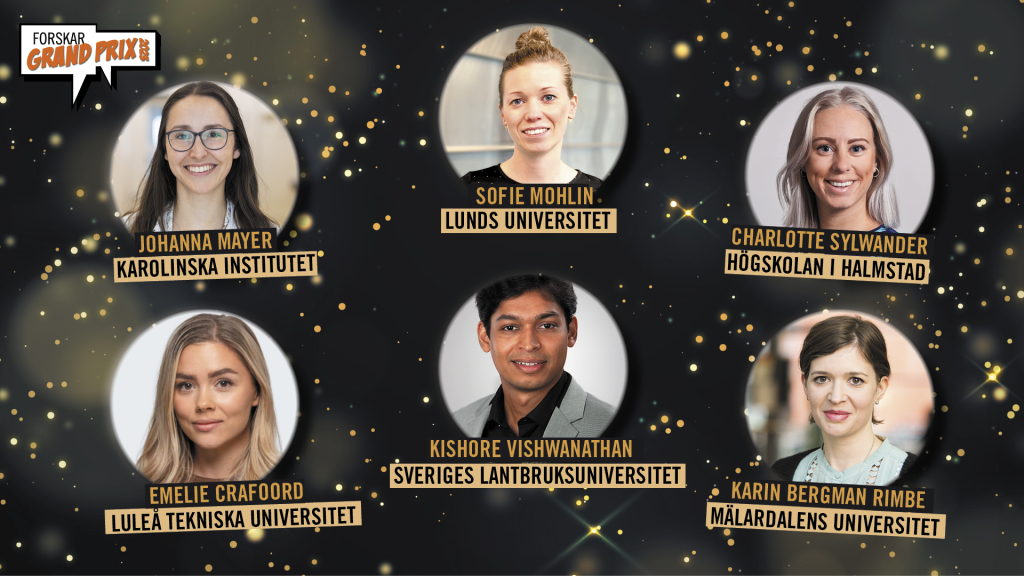Carbon dioxide storage, using chickens to understand cancer, how the forest can benefit from a successful date, health information, norms in schools, and Alzheimer’s research – these are all insights to be gained at this year’s national final of the Swedish Researchers’ Grand Prix. On 23 November, six researchers will take to the stage in Stockholm in an attempt to win the votes of the audience and expert jury.

In Sweden’s largest science communication competition for researchers, the aim is to explain your research in the most engaging, understandable and educational way possible – in just four minutes. Throughout the autumn, six researchers qualified for the national final of the Researchers’ Grand Prix through five regional heats held across the country and via an online contest.
The first finalist of the year was selected in Luleå. During a regional heat held at the House of Technology, Emelie Crafoord, from Luleå University of Technology, was voted the winner. Her research is focused on developing a more energy-efficient technology for capturing biogenic carbon dioxide from industry for storage in Swedish bedrock.
”It feels exciting to have the opportunity to reach a broader audience with my research through the final. Just like in the regional heat, it will be interesting to hear and learn more about the other participants’ research,” commented Emelie Crafoord upon gaining a place in the final.
Matchmaking in the Forest and Norms in Schools
In Umeå, Kishore Vishwanathan, who conducts research at SLU (the Swedish University of Agricultural Sciences), won the audience’s and jury’s votes in a packed auditorium at Minerva upper secondary school. His approach was to find an amusing angle to describe the relationship between feather mosses and nitrogen-producing cyanobacteria, comparing it to interactions on a dating app.
”It’s about two organisms creating a relationship with each other. The feather moss needs nitrogen, and the bacteria produce it. It works in a similar way to dating, and I describe how these two meet, communicate with each other, and form a relationship,” explained Kishore Vishwanathan.
Karin Bergman Rimbe, from Mälardalen University, secured victory in Eskilstuna’s regional heat with a presentation on her research into norms and well-being in schools.
”It was much more fun and rewarding than I had anticipated. This format, presenting your research in just four minutes, isn’t something I’m used to, so it was very informative and developmental. Now I’m going home to prepare for the final in Stockholm,” she shared upon winning the regional heat.
Recycling, Alzheimer’s, and Chronic Pain
Stockholm’s regional heat was won by Johanna Mayer from the Karolinska Institute. She raised the question of whether garbage recycling can prevent Alzheimer’s and captivated the audience’s interest with a self-drawn animation.
”In my presentation, I tried to explain complex research in an illustrative manner using a range of metaphors. While thinking about how to explain my research in just four minutes to upper secondary pupils, I had to look at my research question and results in a completely new way,” she shared after the competition.
The fifth finalist of the national final, Charlotte Sylwander from Halmstad University, qualified through tanhe online heat. This heat was open to active researchers from all over Sweden, and the competition entries were pre-recorded instead of being presented live on stage. During the week of ForskarFredag (European Researcher’s Night in Sweden), the recorded presentations were available for the public to view and vote for online. The votes were then combined, as in the regional heats, with scores from an expert jury.
”It feels incredibly exciting to have won the regional heat and make it to the final! All the entries this year were very creative, and it’s great to see this type of development in science communication. I was extremely nervous right up until the end and I am so happy and grateful to everyone who voted for me and my entry,” said Charlotte Sylwander, who researches ways to promote health in individuals with, or at risk of developing, chronic pain.
Erasing Stereotypes
The final regional winner was selected in Lund. Sofie Mohlin’s presentation is based on how research using chick embryos can contribute to curing a rare form of childhood cancer. Through her participation in the Researchers’ Grand Prix, she aims to inspire young people to consider a future in research.
”It’s not uncommon for academia to be seen as inaccessible and dull, and since I genuinely love my job, I want to change that perception. For me personally, it’s also important to erase the stereotype of what a researcher looks like and behaves like, for example, by showing that even a woman with two children and no academic background can lead her own research group,” said Sofie Mohlin after the competition.
Now, an intense month awaits the finalists. Each of the six researchers will be given training by a presentation coach to help them fine-tune their presentations before they all gather to perform at the Vasa Theatre in Stockholm on 23 November.
Participate and cast your vote in the 2023 final
The 2023 final will be held at Vasa Theatre in Stockholm on 23 November at 13:00 – 15:00.
Would you like to be part of the audience and vote for this year’s winner? Register here!
The final can also be followed live online. Register here to receive a link to the live broadcast.
The Researcher’s Grand Prix competition is organised jointly by the non-profit organisation VA (Public & Science) together with the four research councils Formas, Forte, the Swedish Research Council, and Vinnova.
